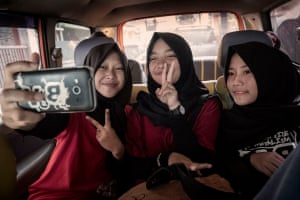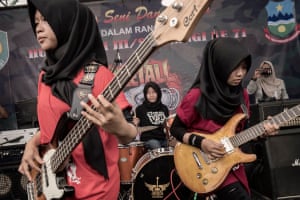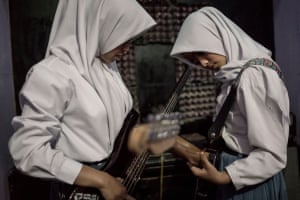The schoolgirl thrash metal band smashing stereotypes in Indonesia
By: kate Lamb
Taking Rage Against the Machine and Slipknot as inspiration, three Muslim teenagers are blasting their way into the Asian music scene as Voice of Bacepro.
It was a dull day in music class that ignited a rebellion in three Indonesian teenage girls.
Poring over their school teacher’s music collection, the hijab-wearing schoolgirls from conservative West Java discovered a trove of heavy metal.
“I just fell in love with metal since that first time I heard it. It felt so rebellious,” said 16-year-old Firdda Kurnia. “I think we found ourselves in the music.”
Kurnia is vocalist and guitarist of Voice of Baceprot, the metal group she formed in 2014 with drummer Eusi Siti Aisyah and bassist Widi Rahmawati. The band is now blasting its way into the Asian music scene, causing consternation among more conservative peers and bringing the three young women death threats and hate mail.
VoB, as they are known, have achieved acclaim throughout Java and appeared on national television, reward for the dedication of the band members who every day after school diligently practised their thrash metal riffs and brainstormed original lyrics.
This week the young women skipped school to travel four hours by road to the capital Jakarta to perform live on national TV.
“Mostly I like bands from outside,” said Kurnia earnestly, as the band waited in the green room before going on set. “You know – like Slipknot, Rage Against the Machine and Lamb of God.”
The girls were dressed in black skinny jeans, matching black headscarves and thigh-length T-shirts emblazoned with the letters VoB, not only an abbreviation of the band’s name but a word that means “noisy” in their ethnic Sundanese language.
Their merchandise also boasts VoB’s tagline: “The other side of metallism”.
“Many people think metal music is satanic but we are showing that there is a different shade, a different side to the music,” said Erza Satia, 35, the music teacher who introduced the girls to heavy metal, and is now their manager.
In the world’s largest Muslim-majority nation, Satia said music is a constructive, creative way for his students to avoid vices such as drugs and “free sex”, the term used to cover any pre-marital sex. Some 90 % of Indonesia’s population of 250 million is Muslim and most are decidedly moderate, but in relatively conservative West Java, the all-girl band has raised many eyebrows and a few haters.

Indeed, Satia has received threatening phone calls pressuring him to break up the band, while religious leaders have tried to obstruct VoB’s concerts – in one case pulling out the power cord to cut the sound.
At home too, the girls’ parents were initially uneasy. Today though, points out drummer Siti, her mum is proudly watching her on TV.
As the band’s reputation has grown, so too has the support and pride of their family and community.
“We can play metal and protect our morals. Of course Islam and metal can match. Why not?” said Kurnia. “Metal is a just a genre of music. The problem is it is often associated with bad things, but it doesn’t have to be.”
They are words the band members live by. After the gruelling day of travel to Jakarta, and screaming down the microphone without a sip of water, they were sticking to their fast in the holy month of Ramadan.
Despite the lack of food and sleep, they were visibly energised. “That was so cool!” said a beaming Siti, after performing their first song. The talkshow hosts, too, were squealing in awe.

The girls of VoB know they are different and they don’t care. Up against a double whammy of gender and religion, challenging stereotypes is something they are taking in their stride.
“I think what we want to say to the young women of Indonesia is, don’t be afraid of being different,” said Kurnia. “Don’t be afraid to shout your independence.”
So far VoB has thousands of fans on social media – even from Israel, they proudly point out – as well as four original songs, which cover social issues such as religious tolerance and climate change.
There are still a few years to go before the trio finish high school, but they have big dreams. “Maybe VoB could be famous,” said bassist Widi, with a shy, toothy grin.
“We are hoping that we can release an album,” added Kurnia. “And we are dreaming of performing overseas, like in England or America.”
“Or maybe,” said Widi, “in an Arab country?”











